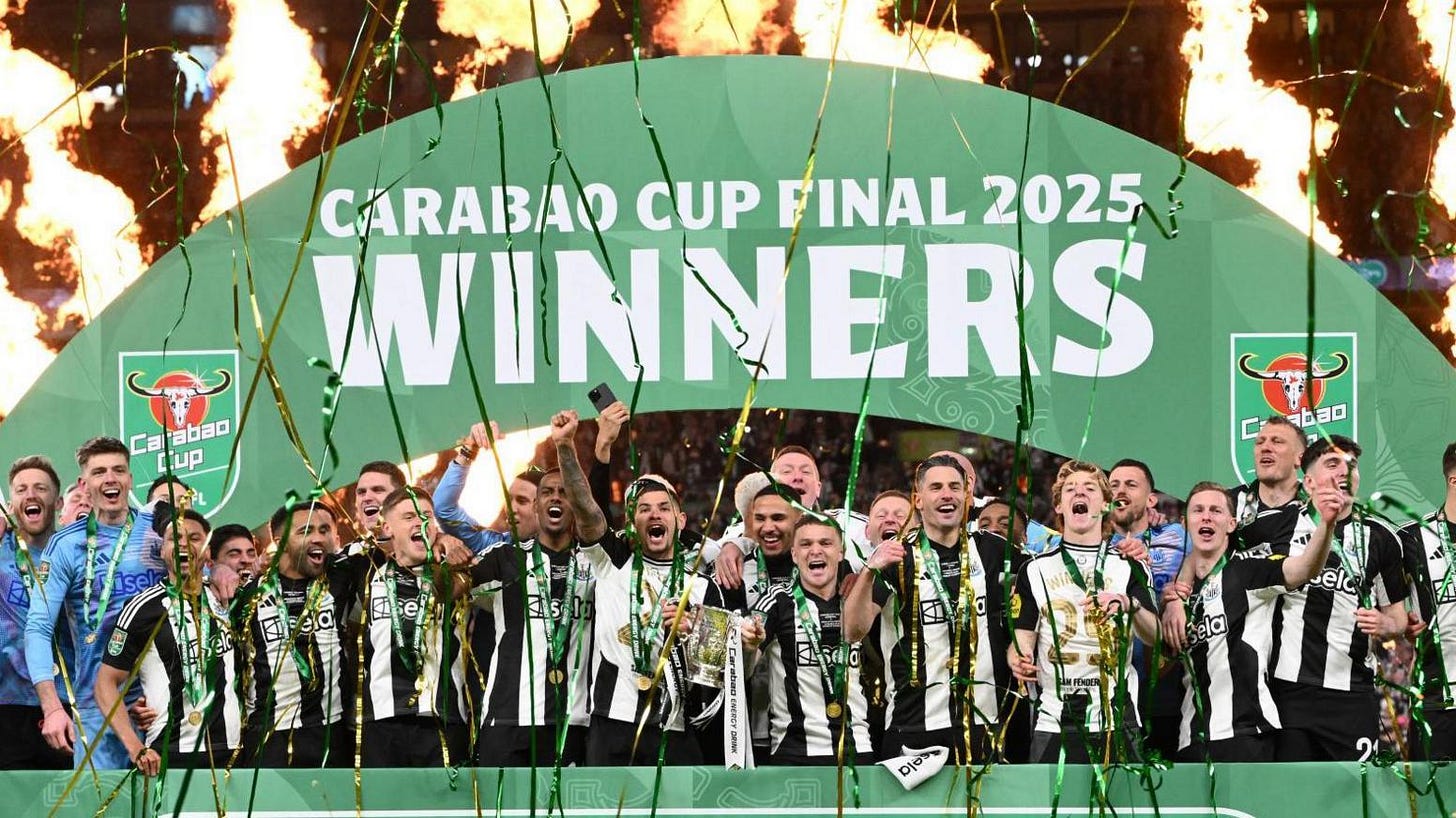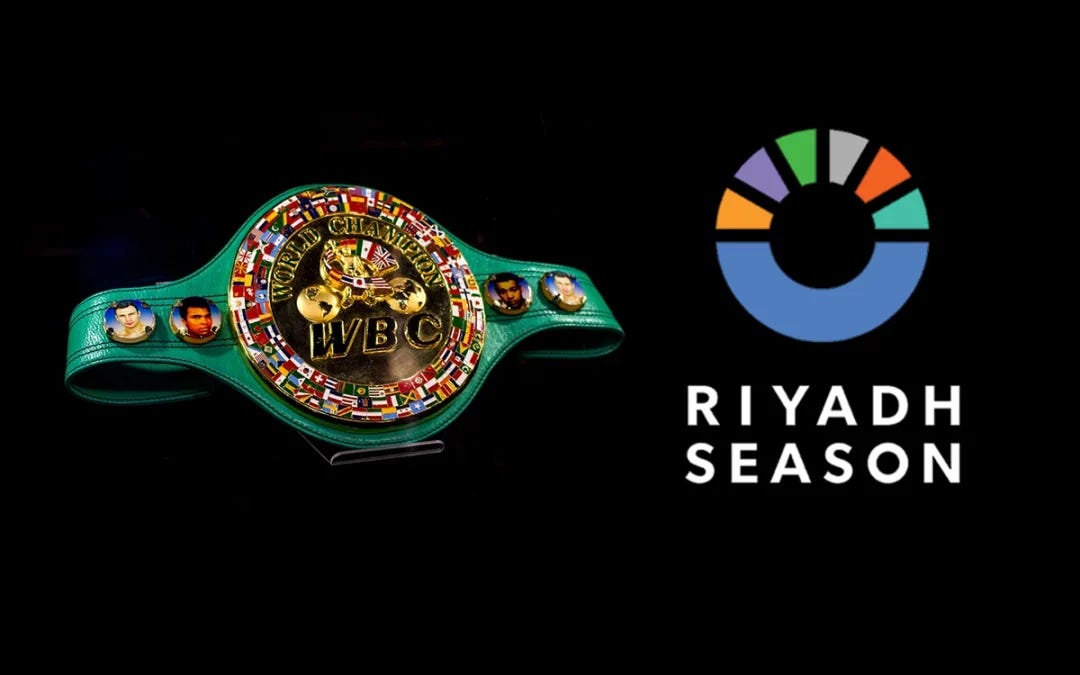The Selective Outrage of "Sportswashing"
How manufactured moral panic about Arab money in sports distracts from more powerful systems of influence
Last Sunday, Newcastle United won a cup final.
70 long years of hurt, gone in one glorious instant.
In the past week, I consumed a fair bit of content, in the aftermath of this long overdue victory.
I couldn't help but notice a pattern almost everywhere.
Whilst of course there were plenty of congratulations, in almost every article there was a reference to "sportswashing" – that tired accusation against Saudi ownership.
Let me enjoy the moment, man.
Sportwashing is where 'sport' is used to mask or cover up human rights abuses. A form of soft power some might say.
Same story with Man City (Abu Dhabi), PSG (Qatar), and LIV Golf (Saudi). Riyadh Season in boxing is similar. Their victories (or the events themselves) come with asterisks. Their achievements are deemed more hollow.
Meanwhile, Roman Abramovich owned Chelsea for years with barely a whisper – until Russia invaded Ukraine. Chinese investments raised no alarms. American billionaires with questionable track records are celebrated as savvy businessmen.
I get it to an extent. As a traditionalist and purist in some spheres, nobody wants the thing they love to be 'hijacked' by foreign entities, who then influence the direction of it.
But it's curious, isn't it?
We rage about "sportswashing" but stay silent about:
Movie-washing: Hollywood cleansing certain narratives while demonising others. How many films humanise Palestinians / Muslims? How many villainise them?
Information-washing: Media conglomerates deciding what's newsworthy. The same death toll that's a "massacre" in one country is a "complicated situation" in Gaza.
Digital-washing: Tech platforms suppressing some voices while amplifying others. Post about certain human rights abuses and watch your reach mysteriously decline.
Finance-washing: Banks determining who gets capital while preaching meritocracy. Entire communities redlined out of opportunity while we're told the system is fair.
Culture-washing: The Arts, Entertainment, Comedy, Music and fashion industries are who shape our collective thought as a society. Who owns and funds them?
Education-washing: Universities shaped by donor interests while claiming to be bastions of free thought. Some questions are encouraged; others end careers.
These influences shape our reality daily, programming our perceptions from childhood. Yet our outrage is seemingly reserved only for Arab nations buying sports teams.
When AIPAC spends $100 million in a single election cycle to defeat candidates critical of Israel, we don't call it "democracy-washing" - even though it's the most dangerous of the lot.
When news networks frame Palestinian resistance as terrorism while portraying Israeli bombs as self-defence, we don't call it "narrative-washing." (We probably should.)
The same Western voices lecturing about sportswashing were silent when Israel bombed Gaza's only football stadium. Their concern for sports integrity is remarkably selective.
The hypocrisy is so naked it becomes a form of gaslighting.
The criticism of "sportswashing" centres on using ungodly amounts of money to generate positive PR and deflect conversations about human rights abuses. When Turki Al-Sheikh pours hundreds of millions into boxing (and other) events for Riyadh Season, the Western media eruption is immediate. When Saudi Arabia's LIV Golf offered guaranteed money to professional golfers, it was portrayed as nothing short of a moral catastrophe.
Yet by this definition of "washing," no entity benefits more from comprehensive operations than Israel - across every domain except perhaps sports. Their absence from the owner's boxes is precisely what allows them to be the loudest critics of others who enter that space.
And so it becomes the one domain where they position themselves as critics, shouting the loudest about the unfairness of money's influence.
This isn't just hypocrisy. It's strategy.
By focusing public outrage on Saudi golf tournaments or Qatari football clubs, attention shifts away from the more sophisticated systems of influence that have been operating for decades. It's misdirection at a global scale.
The manufactured outrage over "sportswashing" serves as the perfect smokescreen for the more insidious forms of washing that have become so normalised we no longer see them.
While we debate the ethics of Arab investment in sports, we ignore the complete capture of our political systems, media narratives, and cultural institutions.
The Arabs buy football clubs. Israel buys congressmen.
The Saudis sponsor boxing matches. Others sponsor wars.
Qatar hosts a World Cup. Others control what world events even make the news.
Which poses the greater threat to democracy?
Those who scream loudest about "sportswashing" have perfected every other form of washing imaginable. And no amount of it will remove the blood on their hands.
They're not offended by the tactic. They're offended by the competition.













